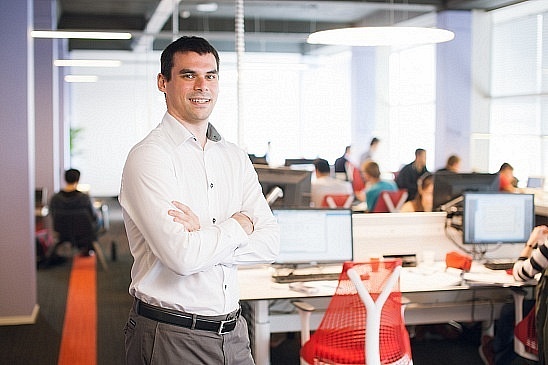Alexandru Iosup (Bucharest, Romania, 1980) was named the Netherlands’ Teacher of the Year on Saturday, January 17, 2015. Awarded by the Dutch National Students’ Association (ISO), the TU Delft Electrical Engineering, Mathematics and Computer Science Assistant Professor was recognized for his innovative teaching methods, particularly the use of gamification in his courses.
To highlight the important role that teachers play in the personal and academic development of students, the ISO organized the first Teacher of Year Elections in October 2014. Out of more than twenty nominees, the ISO jury selected five outstanding candidates for their involvement, passion and groundbreaking approach to education. The Dutch Minister of Education Jet Bussemaker presented the award during the official ceremony in Utrecht.
As the only international to be selected by the ISO jury, Iosup felt honoured by the recognition and considered the award as the highest possible distinction. “It is indeed very rewarding and it feels great [to have won],” Iosup said. “Personally, it reinforces my appreciation for the Dutch society. I got so much support from my colleagues that I did not feel like a foreigner for a second during the competition. Perhaps, this can illustrate not only how well a Romanian can succeed in the Netherlands, but also how well the Netherlands can succeed in appreciating all its talent.”
Indeed, this was not the first time Iosup was acknowledged for his creativity and engagement in the classroom. In November 2014, the Romanian was voted “Best Lecturer at TU Delft” during the annual Best of TU Delft Awards. By applying techniques developed for computer games in higher education courses, Iosup can cater to different types of students, motivating them to learn and to excel in their studies.
“Every student counts!” the assistant professor said. “Most traditional courses have a narrow focus, typically on moderately achieving students. I believe we need to inspire every student and gamification can help tremendously.” According to Iosup, students must be motivated to find their own path of advancement. In doing so, they will continue to learn long after they have graduated, keeping the Netherlands competitive in the long term.
Nevertheless, the Romanian is convinced that there is still much to be done before gamification can be fully integrated into higher education. Creating the necessary ICT infrastructure, gaining a better understanding of gamification through research and helping others learn about gamified courses and how they can be used in the classroom are just some of the ways Iosup believes that this can be achieved.
“Personalized education is the future,” Iosup claimed. “I hope my professional opinion will be taken into consideration when innovation in education becomes part of the national debate, as I think it should. With gamification now in the spotlight, I hope more professors will adopt it. Even if gamification itself is not adopted, I hope more professors will be inspired to try to support the different types of students.”



Comments are closed.